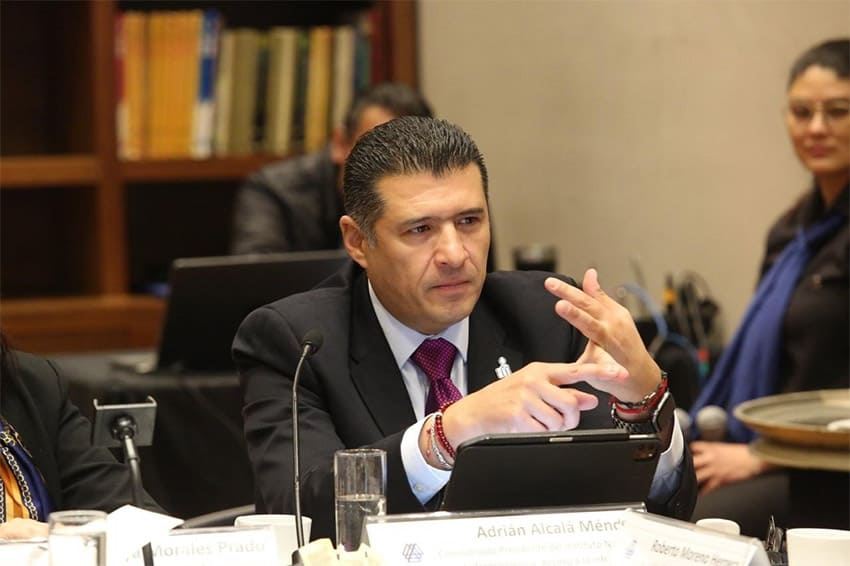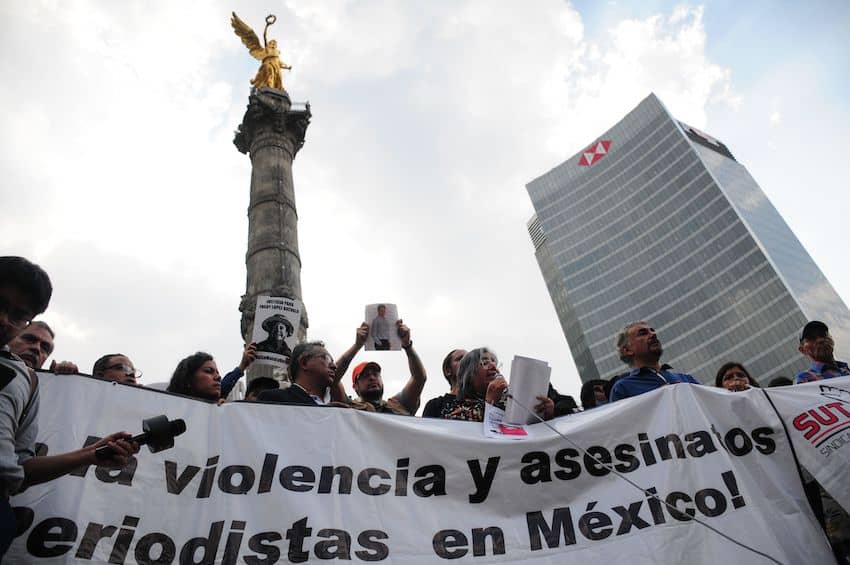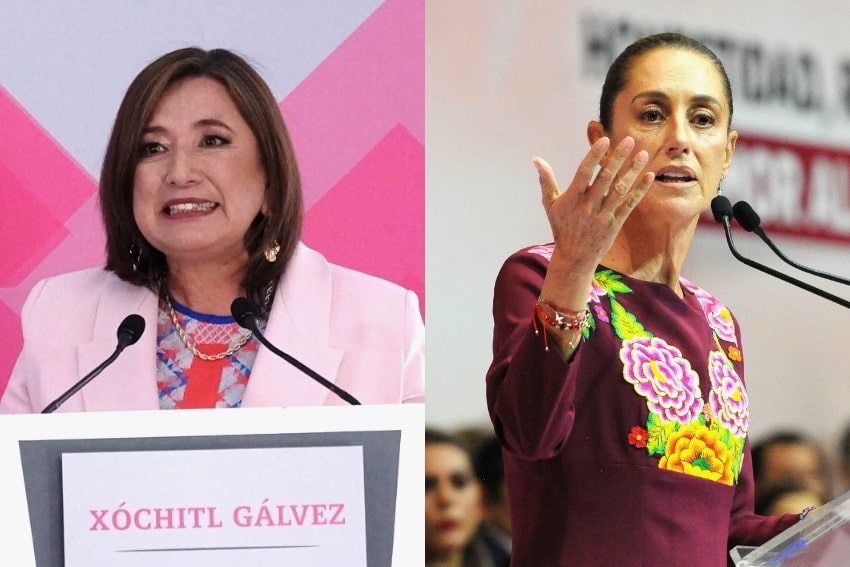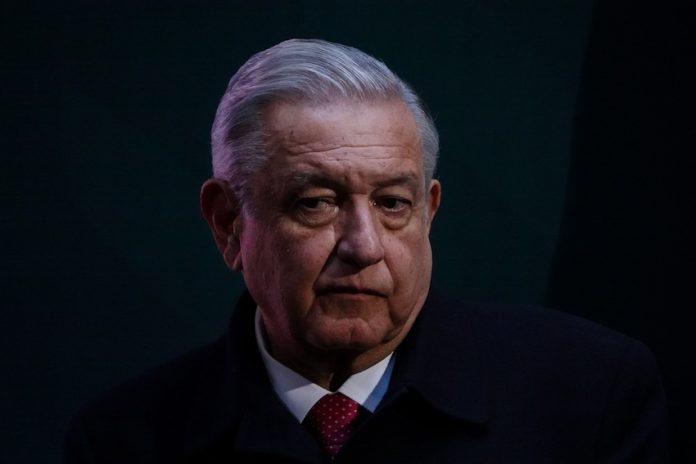President Andrés Manuel López Obrador’s disclosure of a journalist’s telephone number last Thursday triggered a range of repercussions, including an investigation by the national transparency agency INAI and the leaking of the telephone numbers of the two women vying to become Mexico’s first female president.
At his widely-watched morning press conference, López Obrador displayed and read aloud the telephone number of the New York Times’ bureau chief in Mexico, Natalie Kitroeff, when responding to questions put to him by the newspaper about an inquiry in the United States into allegations that people close to him, including his sons, received drug money during his presidency.
The president denied all the allegations before the Times had even published them in an article headlined “U.S. Examined Allegations of Cartel Ties to Allies of Mexico’s President.”
The Times’ report noted that the “the United States never opened a formal investigation into Mr. López Obrador, and the officials involved ultimately shelved the inquiry.”
Nevertheless, it gave further ammunition to critics of AMLO, who were quick to label him a #narcopresidente after three media outlets last month published allegations that his 2006 presidential campaign received millions of dollars in drug money. The president’s disclosure of Kitroeff’s telephone number was widely criticized in a country where violence against journalists — and women — is a major problem.
Here is an overview of the key events following López Obrador’s doxing of the NYT’s Mexico bureau chief at his morning presser.

The NYT denounces the president
The Times — which the president had slammed as a “filthy rag” — responded to López Obrador in a post to its public relations account on the X social media platform.
“This is a troubling and unacceptable tactic from a world leader at a time when threats against journalists are on the rise. We have since published the findings from this investigation and stand by our reporting and the journalists who pursue the facts where they lead,” said the statement posted to the @NYTimesPR account.
INAI announces a probe
The National Institute for Transparency, Access to Information and the Protection of Personal Data (INAI) announced in a statement on Thursday that it would commence an investigation into López Obrador’s disclosure of Kitroeff’s telephone number in order to determine whether he had violated Mexico’s personal data privacy laws.
AMLO stands by his actions and responds to INAI
At his Friday morning presser, López Obrador doubled down on his decision to divulge Kitroeff’s phone number, denying the suggestion that he had made a mistake in doing so and declaring that he would do it again.
When a reporter noted that “anyone” could call the journalist and “anyone” could threaten her, AMLO asserted that “absolutely nothing” would happen, even though aggression toward members of the press is a major problem in Mexico.
Probed about his alleged violation of the law, López Obrador claimed that his “moral authority” and “political authority” are “above that law.”
“We’re not criminals, we have moral authority,” he said, adding that neither The New York Times nor anyone else had the right to “put us in the dock.”

The head of INAI — one of the autonomous government agencies López Obrador would like to get rid of — subsequently said that “absolutely no one” is above the law.
In a post to X, Adrián Alcalá also underscored “the seriousness” of the president disclosing the personal details of any person, “especially” those of a journalist.
Press groups denounce the president
The Committee to Protect Journalists (CPJ) and Article 19 both denounced the president for disclosing Kitroeff’s phone number.
“It is unacceptable and dangerous that Mexican president Andrés Manuel López Obrador reveals the contact information of a reporter in response to critical questions asked of his administration by her outlet,” said Jan-Albert Hootsen, CPJ’s Mexico representative.
Article 19 called the president’s actions “a serious attack on freedom of expression rights and on the privacy of the journalist,” adding that he was seeking to “intimidate” The New York Times.
White House spokesperson: “Obviously not something we support”
White House spokesperson Karine Jean-Pierre was asked about López Obrador’s doxing of Kitroeff at a press conference on Friday.
“I’ve not seen that. Obviously, that’s not something we support. We believe in the freedom of the press, obviously, which is why we do this on [an] almost on a daily basis,” she said.

Telephone numbers of Sheinbaum, Gálvez and AMLO’s son all leaked
The telephone number of José Ramón López Beltrán, the president’s oldest son, was leaked on social media in the wake of his father’s widely-criticized disclosure last Thursday. The online publication of the numbers of ruling Morena party president candidate Claudia Sheinbaum and opposition candidate Xóchitl Gálvez followed.
“Today I have been receiving non-stop calls and messages of hate … because someone published my cell phone number on social media,” Sheinbaum said on X on Saturday.
“It’s clear what they want to do [but] again their attacks are as crude as they are inoffensive. The numbers they should worry about are those from the polls,” she wrote, acknowledging that she is the clear frontrunner in the contest to become Mexico’s next president.
Sheinbaum published one of the messages she had received and indicated she would change her telephone number.
Gálvez said in a video message that her number was also leaked as a “result of the terrible example set by López Obrador.”
She said that she too had received many messages, but highlighted that many of them were to express support. Gálvez, who will represent a three-party opposition alliance in the presidential election, said she wouldn’t change her number and even read it aloud in her video message.
For his part, López Beltrán asserted that the leaking of his number was “a form of revenge and an attempt to do harm,” adding that it put his family in danger.
“This situation began with a letter that contained threats and lies directed at the president of Mexico and his sons. What happened afterwards was a consequence [provoked] by the journalist herself, who exposed her telephone number thinking that the president would respond to her libel by calling her,” he wrote on X. “… What do I have to do with all this?”

López Obrador described the leaking of his son’s telephone number as “shameful.”
AMLO: Mexico doesn’t allow “the interference of any foreign government”
In a video posted to social media on Saturday, López Obrador declared that, “we don’t allow the interference of any foreign government in our country.”
He said last week that the allegations published by the NYT wouldn’t affect Mexico’s relations with the United States, although he indicated last month that the previous drug money allegations could have an impact on bilateral ties. He also accused the United States government of involvement in their publication.
Speaking from Mazatlán, Sinaloa, on Saturday, López Obrador said that “Mexico is an independent, free, sovereign country” and “the president of Mexico cannot be slandered.”
“… It must never be allowed. … I’m not going to accept anyone’s calumny. … I don’t accept calumny without proof [from] foreign governments and their agencies, nor do I accept it from newspapers no matter how famous they are,” he said.
YouTube removes videos of president’s press conference, AMLO accuses it of “censorship”
YouTube took down videos of last Thursday’s press conference that had been posted to government channels and López Obrador’s personal channel, which has over 4.2 million subscribers. The video sharing platform said the footage was removed because it violated its policy on harassment and bullying. The footage was later reposted to YouTube after the president’s disclosure of Kitroeff’s number had been edited out.
On social media, López Obrador accused YouTube of “censorship” and declared that it had demonstrated “an arrogant and authoritarian attitude.”
“… The Statue of Liberty has become an empty symbol,” he added.
History repeats itself
At his Monday morning press conference, López Obrador once again presented the letter in which Kitroeff sought responses about the allegations people close to him received drug money. The journalist’s telephone number was once again displayed, albeit just for a brief period before the president asked for it to be removed.
López Obrador subsequently described Kitroeff’s telephone number as “institutional” and “public,” effectively asserting once again that he had done nothing wrong by disclosing it to his large online audience.
By Mexico News Daily chief staff writer Peter Davies (peter.davies@mexiconewsdaily.com)
